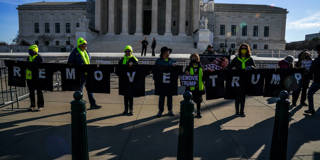OnPoint Subscriber Exclusive
The Big Picture brings together a range of PS commentaries to give readers a comprehensive understanding of topics in the news – and the deeper issues driving the news. The Big Question features concise contributor analysis and predictions on timely topics.

Defensive Democracy
In a case that could alter the course of this year’s presidential election, the US Supreme Court has begun hearing former President Donald Trump’s appeal of a ruling by Colorado’s highest court that his effort to subvert the 2020 presidential election renders him constitutionally ineligible to hold office again. And Germany, too, will decide this year whether the risk of anti-democratic subversion has become too high.
According to Eric Posner of the University of Chicago Law School, while “nearly everyone on the left and right has already decided that the ruling is obviously right or obviously wrong,” the truth is that “both the law and the facts are unclear.” Given this, “the Supreme Court cannot plausibly resolve the case by the sort of narrow legalistic analysis that courts often use,” so it might have to “appoint a special master or commission to engage in expedited fact finding,” followed by a “quick appeal back to the Court.”
But whether a candidate should be disqualified from a democratic election is more than a legal question. Since banning a politician amounts to a “serious restriction on the political process,” Princeton’s Jan-Werner Mueller argues, it “should only ever be used as a last resort,” when a candidate has both “exhibited a clear pattern of anti-democratic conduct over time” and “doubled down on such conduct after clear warnings.” Moreover, banning individuals may well be better for democracy than banning entire parties, as Germany is considering doing with the far-right Alternative für Deutschland (AfD).
In fact, warns Michael Bröning, a member of the Basic Values commission of Germany’s Social Democratic Party, “attempting to outlaw” the AfD – currently “the country’s second-most popular party” – is not only “democratically questionable”; it could also “backfire spectacularly.” Even “debating legal action against the AfD only gives more ammunition to a party that thrives on a sense of victimhood,” and if the AfD were banned, “only the party would disappear; its supporters – and their grievances – would not.” Ultimately, the “far-right challenge must be met in the voting booth, not at the judge’s bench.”
Against this backdrop, Daniela Schwarzer, a member of the Executive Board at the Bertelsmann Stiftung notes, “the choice confronting [German] voters this year could not be more consequential.” Both the AfD and an even newer radical party – the far-left Bündnis Sahra Wagenknecht (BSW), founded by a longtime senior figure in Germany’s far-left party, Die Linke – are “advocating reckless domestic and foreign policies.” Instead of trying to suppress such parties through legal action, however, moderates must “explain that a symbolic protest vote for radicals holds real dangers,” especially at a “time when Germany and Europe must adapt to a new geopolitical environment.”
The stakes in the US are similarly high. As Harvard’s Joseph S. Nye, Jr., explains, if Trump wins the upcoming election, it “could mark a turning point for American power.” In fact, “Americans have more to fear from the rise of populist nationalism at home than they do from the rise of China.”